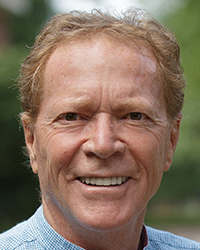2014-2015 APS Mentor Award
Gilles O. Einstein
Furman University
 APS Fellow Gilles O. Einstein is known for his prolific research on prospective memory — remembering to perform actions, such as giving a friend a message or taking medication, in the future. Notably, in 1990 he developed with APS Fellow Mark McDaniel of Washington University in St. Louis a novel laboratory-based technique, which has been used and extended by many researchers.
APS Fellow Gilles O. Einstein is known for his prolific research on prospective memory — remembering to perform actions, such as giving a friend a message or taking medication, in the future. Notably, in 1990 he developed with APS Fellow Mark McDaniel of Washington University in St. Louis a novel laboratory-based technique, which has been used and extended by many researchers.
At Furman University, a liberal arts college where he chaired the Department of Psychology for 16 years, Einstein strives to provide his many undergraduate students with the experience they need to pursue research careers, helping them develop specific research questions from broad interests and challenging them with substantial responsibilities in the lab. His nomination for the Mentor Award included letters from 47 former research students who have gone on to pursue careers in the sciences (including 43 PhD students). Over Einstein’s career, he has published more than 100 journal articles and book chapters, many of these coauthored with Furman undergraduates. He has won two teaching awards at Furman and is also a champion of undergraduate research outside of psychological science. He served for 14 years as chair of the university-wide Furman Advantage program that supports summer undergraduate research opportunities across all disciplines.
“Most of the students Gil works with never knew there was a science of psychology before entering his classroom,” writes former student Michael K. Scullin, currently a postdoctoral fellow at Emory University, “but he finds a way to inspire these students to give science a try.” Einstein has been responsible not only for encouraging students to try science, but also for helping them form professional networks, polishing their public-speaking skills, and helping them apply to and obtain funding for graduate school.
Some of Einstein’s students have been inspired to follow in his footsteps as mentors. Cynthia May, a professor of psychology at the College of Charleston, writes that she took a position at the University of Arizona after completing her PhD but missed the student-mentor interaction that Einstein had taught her to value. After consulting her former mentor, she writes, “I decided to move to a liberal arts institution where I could offer undergraduates the same experiences I enjoyed at Furman” — the mentorship.

